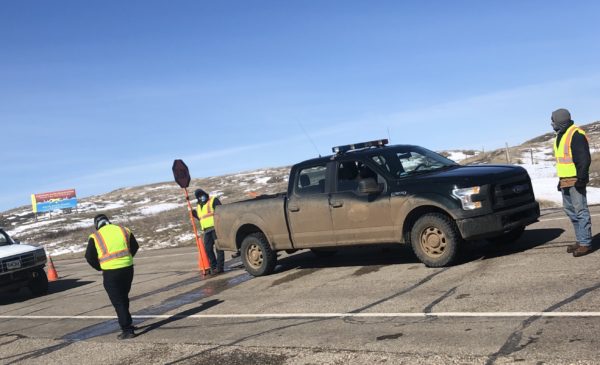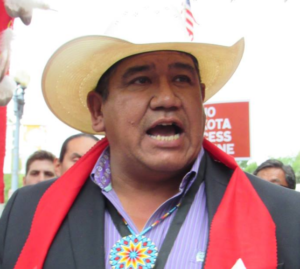
- Details
- By Levi Rickert
CHEYENNE RIVER INDIAN RESERVATION — As COVID-19 began to spread across the country in late March, the tribal chairman of the Cheyenne River Sioux Tribe ordered checkpoints on that would limit non-reservation travelers into the Cheyenne River Indian Reservations.
Chairman Harold Frazier had a reason for the checkpoints: He wanted to protect his tribal citizens and limit the virus from spreading on the reservation.
The checkpoint where the U.S. Highway 212 enters the reservation drew the attention of Bureau of Indians Affairs (BIA) Director Darryl LaCounte in Washington, D.C.
On Friday, April 24, Chairman Frazier received a letter from LaCounte telling the chairman that the State of South Dakota owns U.S. 212 and the tribe cannot legally close or restrict travel on the highway without consulting with South Dakota state officials.
The letter also said the checkpoint “was not established by, and is not being operated by, Cheyenne River Sioux Tribe law enforcement officers.”
The BIA director’s letter gave Frazier 24 hours to respond. Frazier waited 48 hours.
Frazier on Sunday responded by letter to LaCounte and in a news release that he shared with the media.
“Show us how the State of South Dakota owns any land or interest on the Cheyenne River Sioux Tribe reservation and I will show you how the state has violated their compact with the United States and the second condition of the Enabling Act of 1889 as well as Article XXII of the Constitution of the United States,” Frazier said.
“This is a skeleton in the closet of the oppressors that needs to be fixed to be compliant with statehood much as less qualified to govern any land on our territory set aside by treaty.”
Fraizer disputed LaCounte on the issue of whether or not the checkpoint is being operated by duly sworn Cheyenne River Sioux Tribe law enforcement officers.
 Cheyenne River Sioux Tribe Chairman Harold Frazier. Native News Online photograph by Levi Rickert
Cheyenne River Sioux Tribe Chairman Harold Frazier. Native News Online photograph by Levi Rickert
“Our law enforcement officers standing on the boundaries of our reservation are duly sworn officers of the Cheyenne River Sioux Tribe with full authority vested in us by our Constitution that we take seriously. In light of the lack of action to protect our members and residents on the reservation we are doing the best we can with what is available and will continue to do so.”
As far as the lack of consultation with the South Dakota state officials, Fraizer writes: “We have consulted with the state of South Dakota exactly the way the BIA consults with us. In fact, the South Dakota Department of Transportation has inspected our checkpoints and offered technical advice on set up and operation which has been very useful.”
Last week, several South Dakota tribal officials expressed their concerns that South Dakota Gov. Kristi Noem has not acted strongly enough to stop the spread of COVID-19 as have other state governors. So far, she has not instituted a stay-at-home order, banned evictions and power shut-offs, or closed nonessential businesses.
“In light of the lack of action to protect our members and residents on the reservation we are doing the best we can with what is available and will continue to do so,” the Cheyenne River Sioux Tribes said in a press release.
More Stories Like This
Native News Weekly (August 25, 2024): D.C. BriefsUS Presidents in Their Own Words Concerning American Indians
Two Murdered on Colville Indian Reservation
NDAA passes House; Lumbee Fairness Act Advances
NFL, Vikings to Host Native All-American Game, Youth Flag Clinic
Help us defend tribal sovereignty.
At Native News Online, our mission is rooted in telling the stories that strengthen sovereignty and uplift Indigenous voices — not just at year’s end, but every single day.
Because of your generosity last year, we were able to keep our reporters on the ground in tribal communities, at national gatherings and in the halls of Congress — covering the issues that matter most to Indian Country: sovereignty, culture, education, health and economic opportunity.
That support sustained us through a tough year in 2025. Now, as we look to the year ahead, we need your help right now to ensure warrior journalism remains strong — reporting that defends tribal sovereignty, amplifies Native truth, and holds power accountable.
 The stakes couldn't be higher. Your support keeps Native voices heard, Native stories told and Native sovereignty defended.
The stakes couldn't be higher. Your support keeps Native voices heard, Native stories told and Native sovereignty defended.
Stand with Warrior Journalism today.
Levi Rickert (Potawatomi), Editor & Publisher

